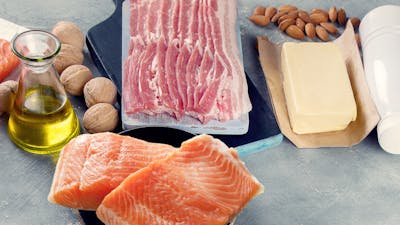- Food
- Fuels
- Bioplastics
- Personal care products
- Single-use plastics
- Textiles

Circe: Transforming greenhouse gases into valuable products with microbes
A gas fermentation platform that uses engineered microbes to produce fats, oils, and other materials
Synthetic Biology
Circe Bioscience is commercializing a gas fermentation technology developed at the Wyss that uses engineered microbes to convert greenhouse gases into fats, oils, fuels, and other materials to decarbonize industry.
The Problem

Modern society is built on carbon: we use fossil fuels to transport people and goods, manufacture products, grow food, and produce energy. But a large portion of this carbon ends up in the atmosphere in the form of greenhouse gases, where it exacerbates climate change and cannot be easily captured and re-used. Alternative sources of carbon, like plants and sugars, can be used instead of fossil fuels, but it is impossible to scale them up to meet global demand. Plus, products like ethanol and bioplastics still largely end up burned or thrown away, their carbon going to waste.
Our Solution
Circe is solving this problem with the power of life itself, in the form of microbes that have been engineered to consume greenhouse gases and produce valuable materials that can be easily harvested and processed. Circe’s gas fermentation technology can be used to manufacture a wide variety of products that are molecularly identical to those found in nature with a fraction of the energy, land, and resources used in conventional manufacturing. Circe launched from the Wyss Institute in 2021 and is now commercializing this technology, with an initial focus on producing food-grade fats like cocoa butter that taste and feel like the real thing.
We envision a truly circular economy in which microbes convert gases to commodity products — from plastics to food to clothes, etc. — and then break them back down to simple gases to restart the cycle.
Product Journey
Circe was conceived and developed by Shannon Nangle, Ph.D. and Marika Ziesack, Ph.D. in the lab of Wyss Core Faculty member Pamela Silver, Ph.D. Both of them had a strong interest in applying synthetic biology to sustainability, and started working together to figure out how they could deploy microbes to solve big problems. They decided to focus on gas fermentation – the process by which microbes convert gases like H2 and CO2 into other substances – and see if they could hack it to get microbes to produce useful commodities.
After years of work, Nangle and Ziesack succeeded in engineering the metabolisms of their microbes so that they would convert greenhouse gases into triglycerides, or the precursor molecules of fats and oils. Triglycerides have the potential to be used in a wide variety of industries, from food to plastic to fuel. While at the Wyss, the team used the Circe platform to successfully produce the precursors of food-grade fats and biodegradable plastics. Based on its high potential for real-world impact, it was named an Institute Project in 2021, and was awarded $3.2 million from the US Department of Energy’s ARPA-E ECOSynBio program. Nangle and Ziesack were also named 2021 Activate Fellows.

Impact
Circe spun out of Harvard as a Wyss startup in 2021, with Nangle and Ziesack joining that year’s cohort of Wyss Lumineers. Nangle was also named an “Innovator Under 35” by MIT Tech Review. Circe raised more than $8 million from investors, and successfully created the world’s first chocolate made with fermentation-derived cocoa butter. The company is developing other food-grade fats, as well as molecules that can replace other oils and chemicals for various industries.